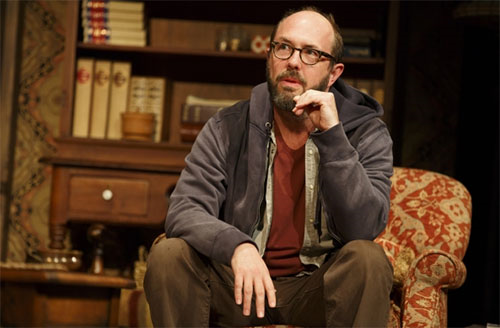Welcome to Building Character, our ongoing look at performers and how they create their roles
The ghost of Konstantin, the tortured young playwright whose diva mother withholds her love in Chekhov's
The Seagull, seems to haunt Donald Margulies'
The Country House, now on Broadway from Manhattan Theatre Club.
In the new play, the broken artist shuffling through the living room is Elliot Cooper, a failed American actor-playwright whose unrealized career is partly due to the selfishness of his famous actress mother, Anna. There's also a hint of the disappointed Uncle Vanya in Elliot, a depressed alcoholic who might've been something if only he'd been bolstered by his extended showbiz clan.
Given all this, you might assume rehearsals for
The Country House were guided by lengthy discussions about Russians, but according to Eric Lange, who makes his Broadway debut as Elliot, there were none.
"It was
mentioned early on, in our first meeting, that the play is inspired by characters in Chekhov and there are themes inherent throughout," he says. "It was a jumping off point for Donald. [Director] Dan Sullivan said, 'I want you to throw all that away. This is not a Chekhov play. Let's just make this about a family.' We never gave Chekhov any real attention."
Lange---known for recurring roles on TV series like
Lost, The Bridge, and
Weeds---resisted the urge to re-read
The Seagull or
Uncle Vanya. He also sought to avoid "the trap of the role"---overplaying Elliot's "pity-me" quality.
"Elliot is someone who is deeply wounded, from childhood on," the actor says. "So to get through life, you adopt these shields, these protective devices. His mind, his sense of humor, his caustic wit."
Lange's physical choices also suggest how Elliot has endured. There is the occasional childlike spring to his step, as when he senses attention from an old crush, or when he invites reunited family and friends to read his new play. Flourishes like these remind us that the character is more than a sad-sack.
And if Lange's performance feels authentic, it's partially because he's informed by the wounds of his own childhood. "When I was a kid I had really big ears that stuck out," he says. "I felt marginalized in a lot of my childhood. Wronged and awkward and out of place and small. Even though I had a lot of friends, my filter was based on these bullies. I swear to this day that there's a part of me that has doubts and insecurities that I'm sure stem from damage done when I was a kid. It's a really powerful period in your life."
Does that mean the actor feels heavy when he leaves the Samuel J. Friedman Theatre?
"I don't take Elliot home with me," he says. "I'm usually this beautiful mix of spent and exhilarated. After most shows, I'm high as a kite."
---
Kenneth Jones is a theatre journalist and dramatist. He also writes at ByKennethJones.com and elsewhere.
Photos by Joan Marcus
